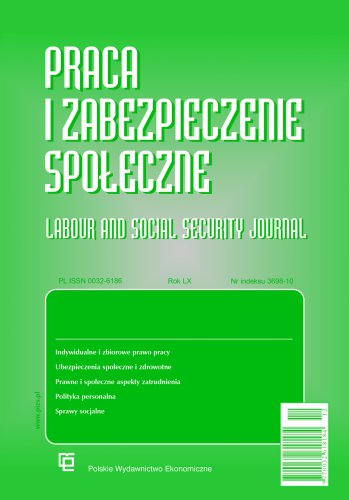The scope of the employee's liability to the employer for damage caused after alcohol consumption
The scope of the employee's liability for damage caused to the employer depends on whether the behaviour causing the damage was intentional or unintentional. The legislator clearly stated in Art. 122 of the Labour Code that if an employee intentionally caused damage, he is obliged to repair it in full, without determining the extent to which the employee who caused the damage while intoxicated should be liable for damages. As a consequence, it should be decided whether the fact of the employee's consumption of alcohol (reaching for work intoxicated) should affect the assessment of his behaviour which is the source of the damage. It should be taken into account that the very construction of the institution of employee material liability meets specific axiological assumptions (not limited to the compensatory function, as is the case with civil liability), and the very fact of being intoxicated (in the broad sense of the word) at work, already constitutes a breach of a basic employee duty. Taking into account the above circumstances, the text reconstructs the possible models of the scope of the employee's liability for damage caused while intoxicated. being after drinking alcohol does not affect the extent of liability, and the above is determined only by establishing that the employee's behaviour causing the damage was intentional. Further, the article presents a model of violation of the employee's pattern of conduct, in which the mere fact of failure to comply with the duty of sobriety actualizes full responsibility for the damage caused in this state. Finally, the third extreme model is the model of civil liability, in which the fact of being intoxicated at work causes the employee to leave the social role of the employee, which in turn means that he can no longer take advantage of the benefits of the employee responsibility regime.
Analysing the models presented above ultimately leads to the conclusion that one should opt for the model of violation of the responsible employee pattern, the more so that this model most widely meets the axiological assumptions (both for employees and employers) of limited material liability, and also does not allow for the relativization of intoxicated employees who are the source of damage. Of course, in order to unambiguously resolve the indicated problems and repeal interpretation discrepancies, the author formulates de lege ferenda postulates, clearly determining the conditions of full liability for damage caused by an intoxicated employee.
References
Andrejew, I., Świda, W., Wolter, W. (1973). Kodeks karny z komentarzem, Wydawnictwo Prawnicze.
Bieniek, G. (2004). Cywilnoprawna problematyka ubezpieczenia OC posiadaczy pojazdów mechanicznych na tle nowych uregulowań, Przegląd Sądowy (5). https://sip.lex.pl/#/publication/151038382/bieniek-gerard-cywilnoprawna-problematyka-ubezpieczenia-oc-posiadaczy-pojazdowmechanicznych-na...?cm=URELATIONS (dostęp: 2023-04-03 16:51).
Florek, L. (Red.). (2017). Kodeks pracy. Komentarz, wyd. VII, Wolters Kluwer. https://sip.lex.pl/#/commentary/587762049/542677 (dostęp: 2023- 04-04 20:22).
Fudała, J., Dąbrowska K. (2013). Środowisko pracy a alkohol – działania profilaktyczne i aspekty prawne, Państwowa Agencja Rozwiązywania Problemów Alkoholowych.
Gersdorf, M., Rączka K., Skoczyński J. (2005). Kodeks pracy. Komentarz, Warszawa. https://sip.lex.pl/#/commentary/587557297/354737 (dostęp: 2023-01-15 18:56).
Giętkowski, R. (2013). Odpowiedzialność dyscyplinarna w prawie polskim, Wydawnictwo Uniwersytetu Gdańskiego.
Golonka, A. (2020). Upicie (upojenie) alkoholowe a problematyka poczytalności sprawcy przestępstwa, Studia Prawnicze. Rozprawy i Materiały 2020, nr 2(27).
Jackowiak, U., Uziak W., Wypych-Żywicka A. (2012). Prawo pracy, podręcznik dla studentów prawa, Wolters Kluwer.
Jędrzejewski, Z. (2016). Artykuł 28 § 1 k.k. po nowelizacji z dnia 20 lutego 2015 r. Uwagi na temat konieczności oddzielania strony podmiotowej czynu zabronionego od winy, Studia Iuridicia, 65. https://sip.lex.pl/#/publication/151312457/jedrzejewski-zbigniew-artykul-28-1-k-k-ponowelizacji-z-dnia-20-lutego-2015-r-uwagi-na-temat...?cm=URELATIONS (dostęp: 2023-04-03 16:39).
Kazmiruk, K. (2009). Przestępstwo prowadzenia pojazdu w stanie nietrzeźwości – wybrane aspektu prawnokarne i kryminologiczne, Białostockie Studia Prawnicze, 6.
Kołbuc, M. (2020). Skutki prawne naruszenia przez pracownika obowiązku trzeźwości, Pracownik i Pracodawca (1).
Korociński, K. (2015). Szkody w majątku pracodawcy, Wydawnictwo CeDeWu.
Kubiak, P. (2015). Stan nietrzeźwości jako „afekt” w rzymskim prawie karnym, Zeszyty Prawnicze Uniwersytetu Łódzkiego (1).
Latos-Miłkowska, M. (2013). Ochrona interesu pracodawcy, LexisNexis.
Majewski, Ł. A., Niedziński T. (2015). Kodeks pracy. Wybór orzecznictwa. Komentarz orzeczniczy, Wolters Kluwer.
Maniewska E., Jaśkowski K. (2023). Kodeks pracy. Komentarz aktualizowany, LEX/el., (https://sip.lex.pl/#/commentary/587260482/715997 (dostęp: 2023-04-04 20:10)
Markiewicz, I. (2021). Odpowiedzialność karna sprawcy popełniającego czyn zabroniony w stanie nietrzeźwości lub odurzenia, Alcoholism & Drug Addiction/Alkoholizm i narkomania, 34, 4.
Papierkowski, Z. (1966). Projekt kodeksu karnego: actio libera in causa, Palestra 7/6(66).
Piech, K. (2019). Zawinienie na przedpolu czynu zabronionego a wprawienie się w stan niepoczytalności przez sprawcę uzależnionego, CZPKiNP, Rok XXIII(1).
Pisarczyk, Ł. (2008). Ryzyko pracodawcy. Wolters Kluwer.
Rycak, M. (2019). Employee's obligation to submit topreventive tests for sobriety, Studia z Zakresu Prawa Pracy i Polityki Społecznej (4).
Sanetra, W. (1975). Wina w odpowiedzialności pracowniczej, Państwowe Wydawnictwo Naukowe.
Sanetra, W. (1977). Odpowiedzialność pracownika i jej przesłanki w kodeksie pracy, Ruch Prawniczy, Ekonomiczny i Socjologiczny (4).
Sierocka, I. (1997). Odpowiedzialność materialna pracowników (art. 114–127), Prawo Pracy (4). https://sip.lex.pl/#/publication/ 151008347/sierocka-iwona-odpowiedzialnosc-materialna-pracownikow-art-114-127?cm=URELATIONS (dostęp: 2023-04-03 16:42).
Skąpski, M. (2006). Ochronna funkcja prawa pracy w gospodarce rynkowej, Wolters Kluwer.
Staszewska, E. (2013). Odpowiedzialność pracownicza, Wolters Kluwer.
Tarapata, S. (2015). Obiektywna czy subiektywna przewidywalność? Głos w sprawie sporu dotyczącego nieświadomej nieumyślności, CZPKiNP rok XIX (1).
Zelek, M. (2019). Wina w prawie karnym i prawie deliktów – przyczynek do dyskusji na temat tożsamości pojęcia winy w prawie polskim, Acta Iuris Stetinensis.

